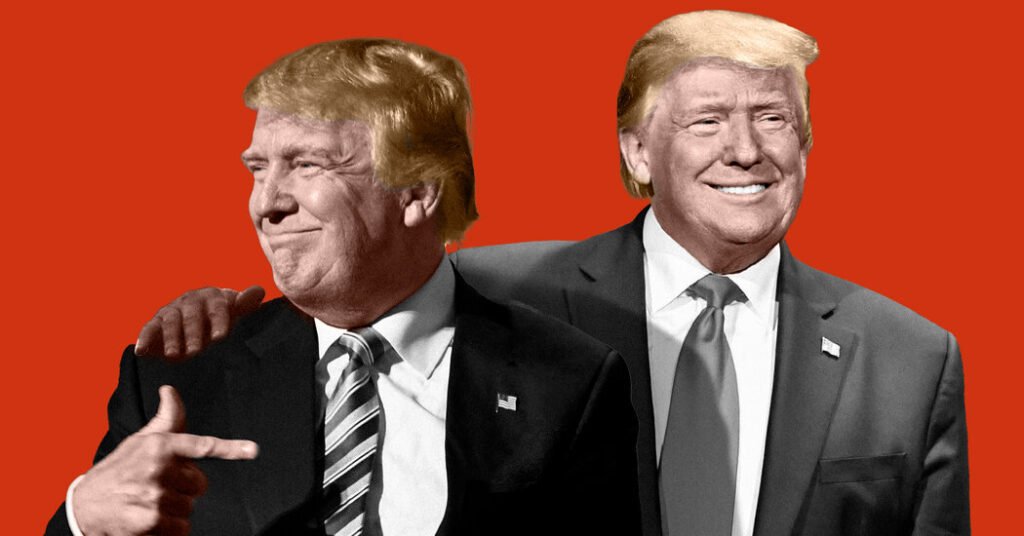The first 2024 presidential debate, scheduled to take place next week, offers voters a chance to scrutinize the candidates’ political views and personal attitudes. But it also offers linguists a rare opportunity to compare the candidates’ speech patterns side-by-side. You don’t need to be a political savant to see that Joe Biden and Donald Trump speak very differently. Of the two, Biden’s speech is, linguistically speaking, more conventional and therefore less interesting. Meanwhile, Trump’s speech is fascinating, whatever you think of his ideas. It’s distinctive.
Still, it’s possible to find connections between the way Trump speaks and patterns of speech in the world. One that’s been bothering me this week is Trump’s habit of calling himself by his name. “Without Donald Trump, we’d never even hear the word ‘immigrant’.” On forcing Barack Obama to show his birth certificate: “Trump got them to give him something.” Others include “Nobody respects women more than Donald Trump” and “18 Angry Democrats Who Hate President Trump Hate Him With All Their Hearts.”
This might seem to suggest a variety of things: Tarzanian linguistic tendencies, a desire to market oneself as a brand, or just plain old inflated ego. But the truth is more interesting: first-person pronouns—the “I” and “myself” that we typically use in place of our names—are more than just ways of referring to ourselves. And there are plenty of reasons why people try to avoid these words, even in casual conversation. The tendency even has a name: ilism.
Avoiding these pronouns can be a way to draw attention away from yourself and avoid coming across as self-centered. In Chinese, you might use the word “little person” instead of “I.” This is like humbling yourself both linguistically and physically. In the English version, it’s a colloquial way of referring to this in the third person. Pointing to yourself and saying, “Who got a raise? This person!” might be a bit more direct than just saying, “I got a raise!” Saying, “This girl has to go home” might feel like a more polite way of saying goodbye than saying, “I have to go home.” Creating a third-person, external perspective frames the goodbye as a scene someone else is acting out.
Substituting your own name is harder. People mocked LeBron James for using the third person to explain why he joined the Miami Heat: “I didn’t want to make an emotional decision. I wanted to think about what was best for LeBron James and what would make LeBron James happy.” This sounded uncomfortably pompous to many, but it can also be seen the other way around. Referring to himself from a distance allowed us to imagine him in the moment and to make some kind of sense of his decision.
Psychologists suggest thinking of yourself as “you” or “he/she/them” to imagine how others see you – another way of reminding yourself that “it’s not all about me.”
None of this explains Trump. When it comes to the former president, of course, it’s always going to be about him. To understand why Trump dislikes the first-person singular pronoun, we need to look at their alternative, and in some ways polar opposite, resonance.
In his work on pronouns, psychologist James Pennebaker has demonstrated that the frequency with which English-speaking people speak (and write) “I” or “myself” varies widely depending on the speaker’s intentions and mental state, so much so that the frequency of the pronouns can be used to infer a person’s sincerity, satisfaction, and confidence. In particular, using “I” or “myself” involves a kind of self-exposure, or vulnerability. Depressed people use these pronouns more than happy people. People who claim innocence and people who are engaged in acts of deception also use these pronouns more often. For example, George W. Bush used “I” more in his press conferences when he publicly asserted that the U.S. government was avoiding war, even though his administration was actually planning to start the war that led to the Iraq War. On the other hand, President Obama has been criticized for his preference for the “I” word, but in fact he used it less than most presidents in modern history, a reflection perhaps of his relatively cool emotional temperature.
Compared with the vulnerability of “I” and “myself,” Trump’s self-references sound like verbal armor. “18 angry Democrats who hate President Trump, hate him with a passion” sounds like a mic drop, while “18 angry Democrats who hate me, hate me with a passion” sounds wounded. “If it weren’t for me, you’d never even hear the word ‘immigrant'” sounds like someone struggling for recognition compared with the more defiant “If it weren’t for Donald Trump, you’d never even hear the word ‘immigrant.'”
Trump’s quirk is more of a rhetorical technique than anything else, and he was quick to point out the “beautiful” wall he was trying to build. cute Trump has been criticized for a variety of things, including his (can it really be?) “perfect” phone call with the Ukrainian president, his habit of emphasizing adjectives with a “very” or two, and his trademark gesture of spreading his arms as if to ignore any objections.
If you’re watching the debate, it might help to do a little impromptu translation: Every time Trump refers to himself as “Donald Trump,” try replacing it with “I” or “myself.” Notice the difference? Translating Trump’s words to their essence, stripping away the charismatic elements, can help you understand what kind of person, or in this case, who, Trump really is.

